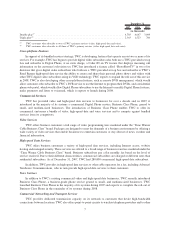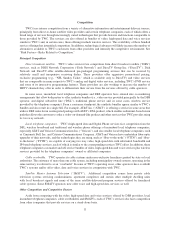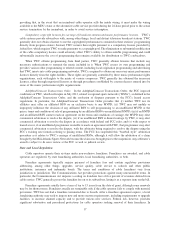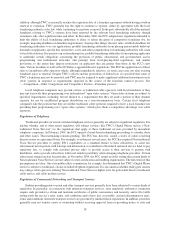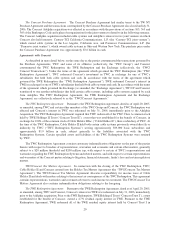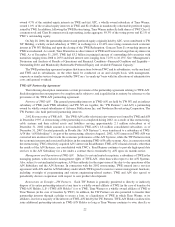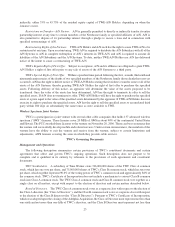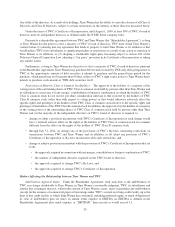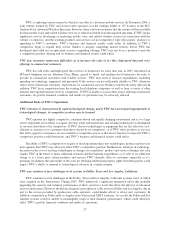Time Warner Cable 2007 Annual Report Download - page 22
Download and view the complete annual report
Please find page 22 of the 2007 Time Warner Cable annual report below. You can navigate through the pages in the report by either clicking on the pages listed below, or by using the keyword search tool below to find specific information within the annual report.providing that, in the event that an incumbent cable operator sells the inside wiring, it must make the wiring
available to the MDU owner or the alternative cable service provider during the 24-hour period prior to the actual
service termination by the incumbent, in order to avoid service interruption.
Compulsory copyright licenses for carriage of broadcast stations and music performance licenses. TWC’s
cable systems provide subscribers with, among other things, local and distant television broadcast stations. TWC
generally does not obtain a license to use the copyrighted performances contained in these stations’ programming
directly from program owners. Instead, TWC secures those rights pursuant to a compulsory license provided by
federal law, which requires TWC to make payments to a copyright pool. The elimination or substantial modification
of the cable compulsory license could adversely affect TWC’s ability to obtain suitable programming and could
substantially increase the cost of programming that remains available for distribution to TWC’s subscribers.
When TWC obtains programming from third parties, TWC generally obtains licenses that include any
necessary authorizations to transmit the music included in it. When TWC creates its own programming and
provides various other programming or related content, including local origination programming and advertising
that TWC inserts into cable-programming networks, TWC is required to obtain any necessary music performance
licenses directly from the rights holders. These rights are generally controlled by three music performance rights
organizations, each with rights to the music of various composers. TWC generally has obtained the necessary
licenses, either through negotiated licenses or through procedures established by consent decrees entered into by
some of the music performance rights organizations.
Adelphia/Comcast Transactions Order. In the Adelphia/Comcast Transactions Order, the FCC imposed
conditions on TWC, which will expire in July 2012, related to regional sports networks (“RSNs”), as defined in the
Adelphia/Comcast Transactions Order, and the resolution of disputes pursuant to the FCC’s leased access
regulations. In particular, the Adelphia/Comcast Transactions Order provides that (i) neither TWC nor its
affiliates may offer an affiliated RSN on an exclusive basis to any MVPD; (ii) TWC may not unduly or
improperly influence the decision of any affiliated RSN to sell programming to an unaffiliated MVPD or the
prices, terms and conditions of sale of programming by an affiliated RSN to an unaffiliated MVPD; (iii) if an MVPD
and an affiliated RSN cannot reach an agreement on the terms and conditions of carriage, the MVPD may elect
commercial arbitration to resolve the dispute; (iv) if an unaffiliated RSN is denied carriage by TWC, it may elect
commercial arbitration to resolve the dispute in accordance with federal and FCC rules; and (v) with respect to
leased access, if an unaffiliated programmer is unable to reach an agreement with TWC, that programmer may elect
commercial arbitration to resolve the dispute, with the arbitrator being required to resolve the dispute using the
FCC’s existing rate formula relating to pricing terms. The FCC has suspended this “baseball style” arbitration
procedure as it relates to TWC’s carriage of unaffiliated RSNs, although it will allow the arbitration of a claim
brought by the Mid-Atlantic Sports Network because the claim was brought prior to the suspension. Any arbitrator’s
award is subject to de novo review at the FCC as well as judicial review.
State and Local Regulation
Cable operators operate their systems under non-exclusive franchises. Franchises are awarded, and cable
operators are regulated, by state franchising authorities, local franchising authorities, or both.
Franchise agreements typically require payment of franchise fees and contain regulatory provisions
addressing, among other things, upgrades, service quality, cable service to schools and other public
institutions, insurance and indemnity bonds. The terms and conditions of cable franchises vary from
jurisdiction to jurisdiction. The Communications Act provides protections against many unreasonable terms. In
particular, the Communications Act imposes a ceiling on franchise fees of five percent of revenues derived from
cable service. TWC generally passes the franchise fee on to its subscribers, listing it as a separate item on the bill.
Franchise agreements usually have a term of ten to 15 years from the date of grant, although some renewals
may be for shorter terms. Franchises usually are terminable only if the cable operator fails to comply with material
provisions. TWC has not had a franchise terminated due to breach. After a franchise agreement expires, a local
franchising authority may seek to impose new and more onerous requirements, including requirements to upgrade
facilities, to increase channel capacity and to provide various new services. Federal law, however, provides
significant substantive and procedural protections for cable operators seeking renewal of their franchises. In
17


